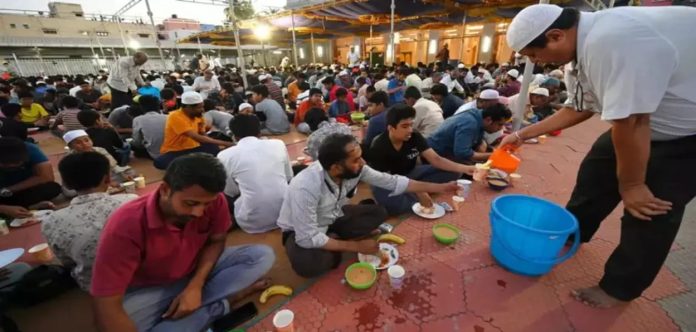Chennai, April 7: In a heartwarming display of communal unity and respect for diverse traditions, the Sufidar temple in Chennai, Tamil Nadu, continues its 40-year-old tradition of serving Iftar meals to around 1200 fasting Muslims daily during Ramadan.
Founded by Dada Ratanchand, a refugee from Sindh who settled down in Chennai after the Partition of 1947, the temple was established to propagate the teachings of Shehanshah Baba Nebhraj, a revered Sufi saint from Sindh. Over time, the temple has become a symbol of religious harmony, adorned with paintings depicting various Sufi saints, Hindu deities, Jesus Christ, Mother Mary, Guru Nanak, and other spiritual figures from diverse faiths.
The tradition of hosting Iftar gatherings began four decades ago when members of the Arcot families were impressed by the temple’s cleanliness and arrangements. Subsequently, the Muslim rulers of Arcot entrusted the temple with the task of preparing Iftar meals during Ramadan.
Despite the passing of Dada Ratanchand, the temple’s management, led by devoted volunteers like Ramdev, has upheld this tradition with unwavering dedication. Volunteers, including Hindus and Muslims, work tirelessly to prepare a sumptuous vegetarian spread comprising fried rice, biryani, vegetable pickles, saffron milk, and fruits.
Each day, the food is transported in a cargo van to the historic Wallajah Masjid, constructed in 1795 by the Nawabs of Arcot. Notably, most of the mosque’s employees are Hindus, showcasing the deep interfaith connections that underpin this act of communal service.
Volunteers cover their heads with traditional Muslim caps while serving the meals, demonstrating a profound respect and sensitivity towards Islam. Ramdev, one of the key organizers, left his automobile shop to commit full-time to this noble cause, exemplifying the selfless spirit behind this initiative.
Prince Nawab Abdul Ali of Arcot commended the temple’s enduring commitment to communal reconciliation, emphasizing the importance of mutual respect and understanding among different religious communities. He emphasized the need for unity in a secular country like India, urging everyone to treat each other as brothers and sisters.
Jamila, a regular participant in the Iftar meals at Wallajah Masjid, expressed gratitude for this thoughtful gesture, highlighting its practical significance for those working near the mosque.
Dada Ratanchand’s vision to promote religious harmony has blossomed into a powerful movement through the Sufidar temple. This initiative, fueled by the collective efforts of volunteers and citizens from diverse backgrounds, serves as a shining example of unity and brotherhood in a pluralistic society like India.




